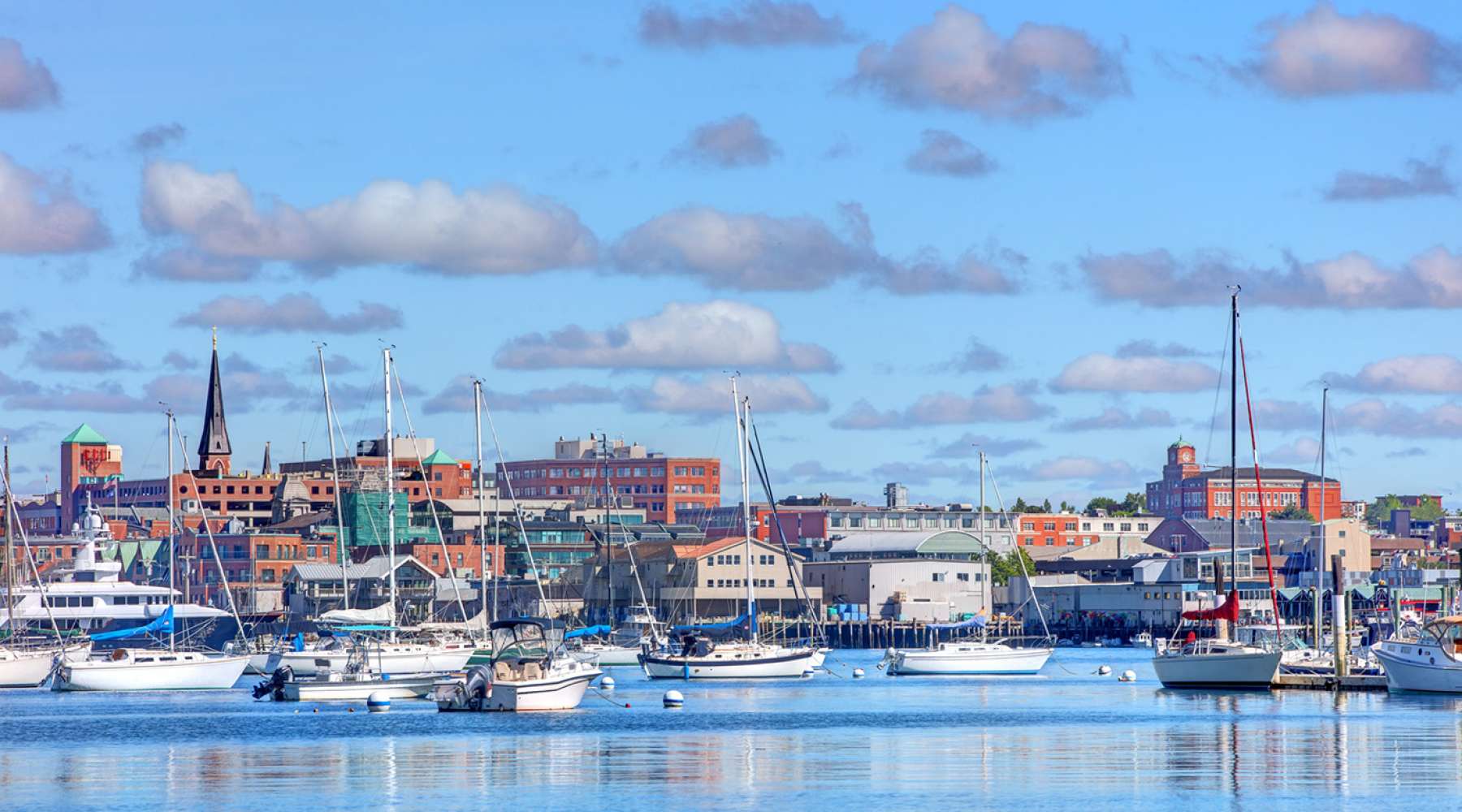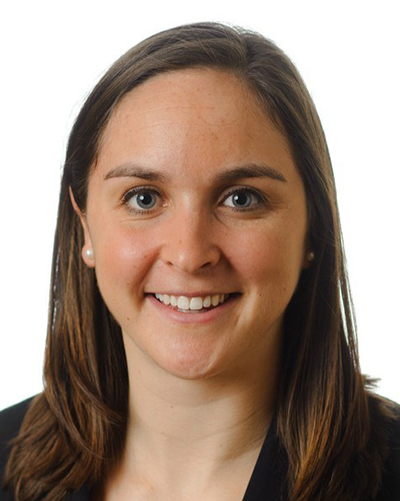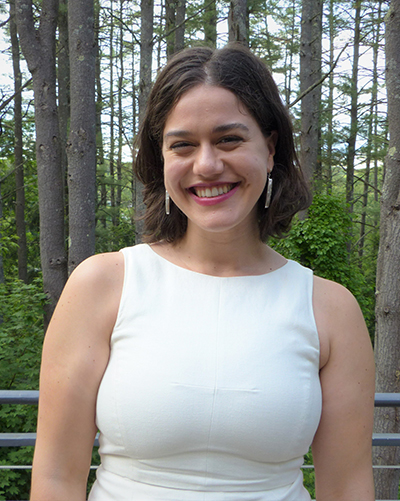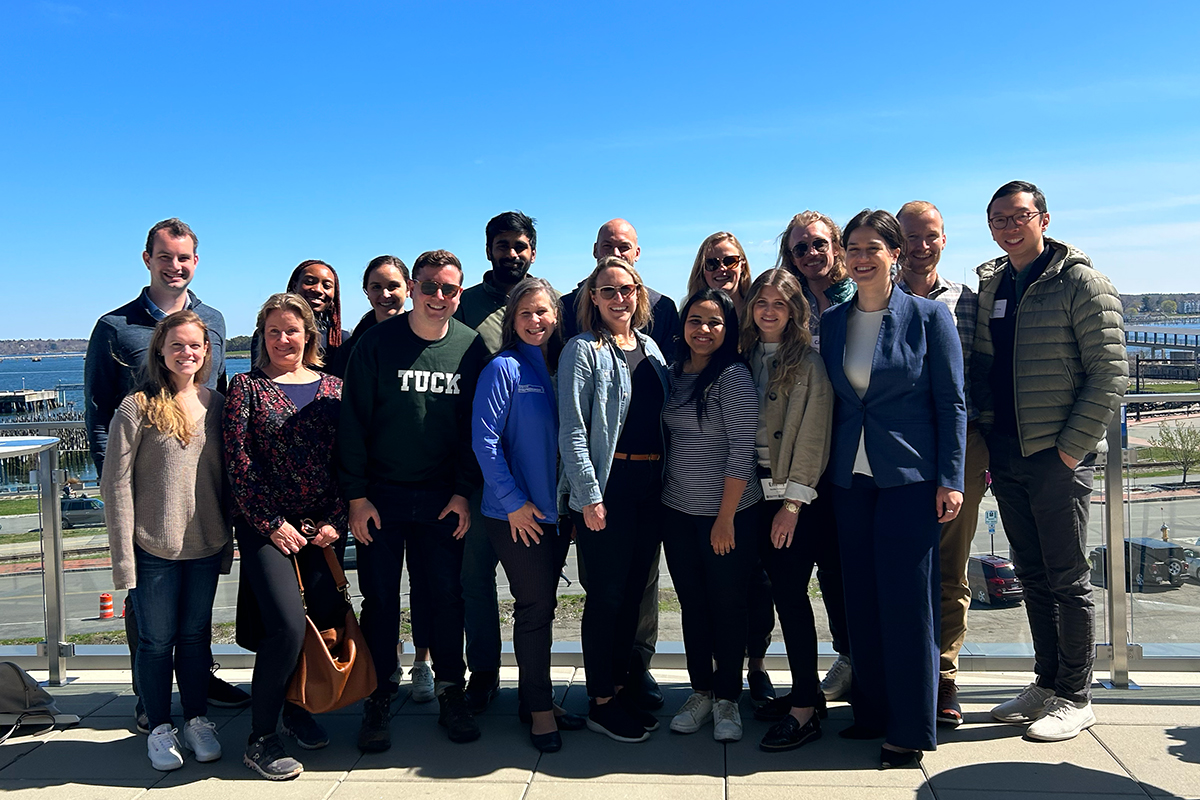
This week, incoming Tuck MBA students embark on Innovations and Regional Impacts of Portland, ME: an Ecosystem Deep Dive (EDD) focused innovation and sustainability with the Tuck Center for Entrepreneurship and the Tuck Center for Business, Government, & Society. T’25s will visit Atlantic Sea Farms, Tanbark, Hyperlite, Island Lobster Company, Sea Bags, Blueprint Surfboards, Bold Ocean Ventures, and Gulf of Maine Research Institute, Maine Venture Fund, Live and Work in Maine, Kit NA Brewing, and more to explore the impact of innovation- and sustainability-focused companies in the Portland region.
The EDD program was also held in April, with T’23s and T’24s in attendance. We sat down with recent graduates T’23s Shannon Conneely and Emilie Litsas to learn more about the program, their key takeaways, and what they enjoyed most about working with Tuck’s Centers.

What made you join the Ecosystem Deep Dive to Portland? Does the goal of the program relate to your own career aspirations and/or personal passions?
I grew up in coastal New England, and centuries of family on my dad's side has been fishermen. The ocean, to me, is one of our most valuable resources - from more sustainable protein sources to transportation. I wanted to take the trip to Portland to understand how coastal communities that depend on the ocean are adjusting to the effects of climate change, and how potential entrepreneurs can contribute to local workforces and reduce the impact on our oceans.
What is your top takeaway from the EDD?
My top takeaway from the EDD in Portland is that although changes in climate is heavily impacting many communities and ecosystems, savvy entrepreneurs can make a lasting impact on both. From recycling ocean plastic to make sunglasses or using lobster enzymes to treat eczema, entrepreneurs are able to identify problems their oceans face and find creative solutions. They're also finding ways to bring existing businesses into their folds and make sustainable changes to practices that have been in place for decades but are ultimately altering the oceans in ways that will make that future use untenable.
Did this trek inform or change your perspective on the intersection of entrepreneurship and social impact?
This trek to Portland has made me realize that being an entrepreneur is about much more than a great business idea. Entrepreneurship is a critical lever for social change and impact. I saw first-hand how people who were determined to make changes to their community were able to eliminate the negative impact on the environment of their local ecosystem and enrich the economy by employing more of their friends and neighbors.
“Centers at Tuck have given me the opportunity to explore real problems that companies and communities face as well as the support to find creative solutions that are typically out of scope (financially or time wise) in the working world.”
How have Centers at Tuck, including the Center for Entrepreneurship and the CBGS, impacted your Tuck MBA experience?
Centers at Tuck have given me the opportunity to explore real problems that companies and communities face as well as the support to find creative solutions that are typically out of scope (financially or time wise) in the working world. While much of our time in the classroom focuses on multimillion dollar decisions, the Centers have helped me realize that for many community businesses, the difference of a few thousand dollars can make or break a business that an entire community depends on. Where will people find childcare, or where will their children learn to ice skate? How do we employ our neighbors and make sure they can make ends meet with rising costs? These are questions that many Upper Valley businesses think about every day, and it has been important part of my Tuck experience to leverage the Centers and give any support I can and learn how to protect small businesses' futures.

What made you join the Ecosystem Deep Dive to Portland? Does the goal of the program relate to your own career aspirations and/or personal passions?
When I heard about this trek, it instantly knew I wanted to apply and hoped to attend. The combination of visiting with companies in Portland, Maine, gaining insight into climate-focused startups, and joining current Tuck students and alumni for two days on the beautiful Maine coast appealed to me personally and professionally.
I interned with the Maine Venture Fund in Portland last summer. In those two months, I was struck by the state and city’s commitment to environmental protection and by how I was welcomed by locals. I only scratched the surface of Portland’s sustainable startup space that summer, and knew I wanted to return to Portland to continue learning from people working in the environmentally responsible startup scene. The EDD offered the perfect opportunity for me to dive deeper into the blue economy and biotech, two industries in which Portland is spearheading thought leadership, while meeting a broader set of startup professionals in the city.
I came to Tuck with the objective to learn how to start and run a social enterprise that promotes sustainable development goals, such as the fair employment of forcibly displaced people, gender equity, and mitigating damages to the natural environment. The EDD program was a great opportunity to expand my learning on the blue economy and sustainability startups in a city where I can imagine living and working, and I’m grateful for it!
What is your top takeaway from the EDD?
I was stunned to hear about the expansive applications of marine byproducts in medicine. For example, cod skin is useful to burn victims and breast cancer survivors and has properties that help regrow their natural skin cells. Prior methods for helping burn victims utilized cadaver skin, which is treated as a foreign substance by the patient, whereas cod skin is effective at helping skin loss survivors to naturally regrow their own skin cells. It’s incredible to imagine the various applications of natural resources, and this fact sparked my curiosity to learn more about biotech.

Did this trek inform or change your perspective on the intersection of entrepreneurship and social impact?
I grew up on the Atlantic Coast in New York in a Greek American family with strong values around preserving the way of life on coastal communities—a way of life that is currently being challenged by the devastating effects of climate change. The Ecosystem Deep Dive introduced me to several companies that work to preserve marine ecosystems, giving me hope in a future with life-sustaining coastlines and introducing me to specific business concepts with economic promise.
A quote I captured during the trek was, “No fish should leave the state with its head and no tree with its bark.” Maine’s commodity producers and exporters treat their byproducts as economically valuable, worth preserving rather than throwing away. The New England Ocean Cluster told us the story of how they learned novel methods for capturing additional value from fish byproducts through a collaboration with an Icelandic fish company. This story showcased the potential for the marine industry to continue to grow in economic terms and in positive impact by applying the latest science and sharing knowledge across nations and companies that share sustainability goals.
“The Ecosystem Deep Dive introduced me to several companies that work to preserve marine ecosystems, giving me hope in a future with life-sustaining coastlines and introducing me to specific business concepts with economic promise.”
How have Centers at Tuck, including the Center for Entrepreneurship and the CBGS, impacted your Tuck MBA experience?
It’s because of these Centers that I gained the confidence to build my career path in social entrepreneurship post-Tuck. From receiving the Tuck Gives scholarship to intern with Maine Venture Fund, to being invited to meet with and moderate a panel of social entrepreneurs for the Center for Entrepreneurship, to participating in the United Nations COP27 climate negotiations in Egypt, my highlights at Tuck have all been made possible by these two centers.
Many of my strongest Tuck relationships are with people I met through the Center for Entrepreneurship’s and CBGS’s programs and events. That’s because both Centers’ staff, faculty, students, and alumni are committed to building meaningful, thoughtful, and provocative discussions about solving critical social problems through business. I’m indebted to these centers for making my Tuck experience truly transformative and setting me on the path I dreamed about post-Tuck with the self-assurance that I have the skills, resources, and professional support system to achieve a financially feasible career in socially impactful work.